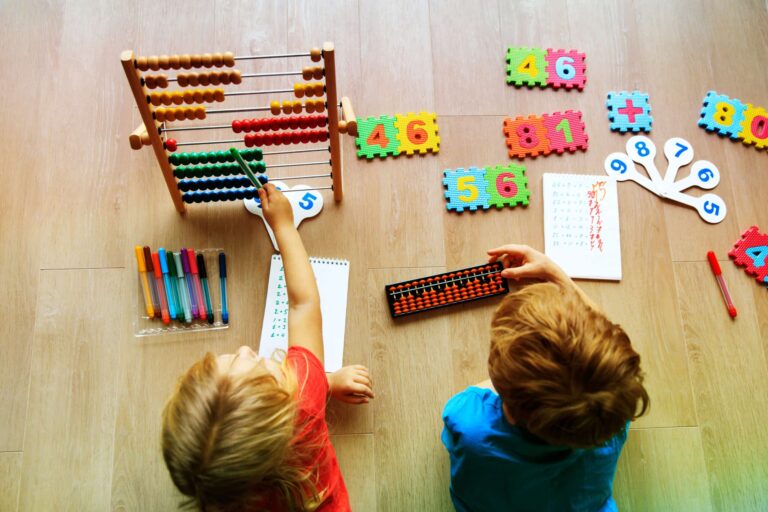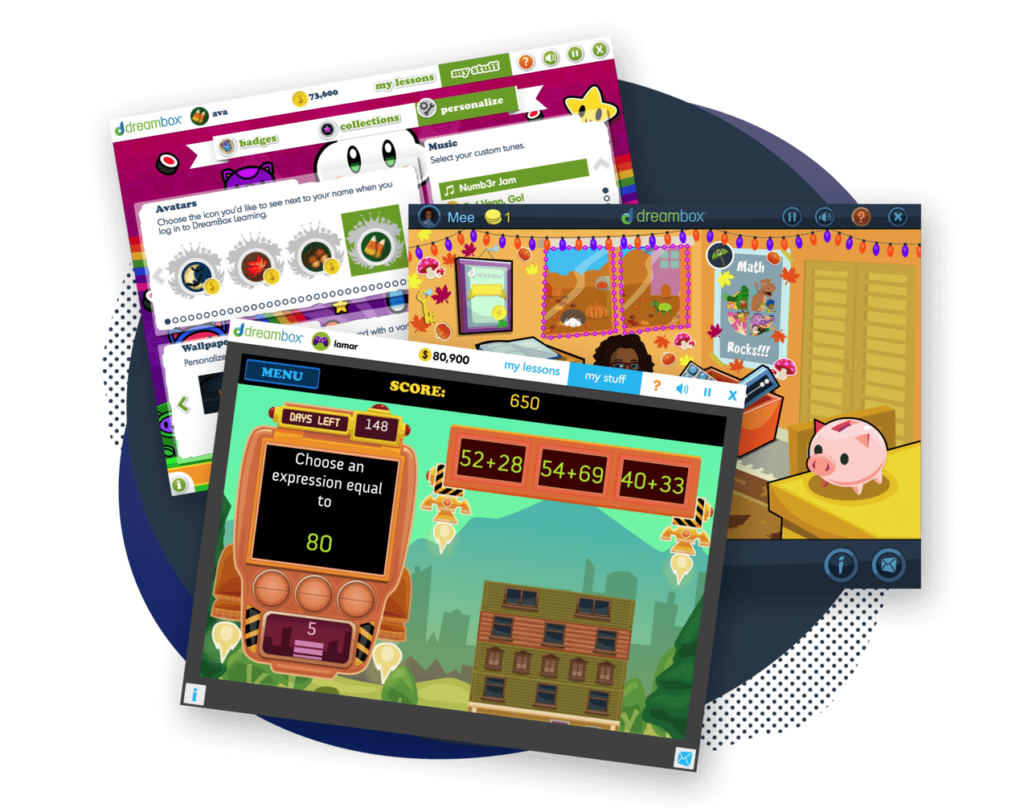How to Make Math Fun for Kids
Math doesn’t have to be a misery. With a little planning and creativity, math can be a joy.

Author
Taylor Hartley
Published:
Oct 2024

Key takeaways
- Math is all around you – Once you realize how math is everywhere, you can see how the subject is vital for making things fun and functional.
- Get interactive – The secret to learning a topic and having fun doing it is to be an active participant. Get creative about the many ways you can interact with math.
- Make it personal – Find ways to make the math relevant and personalized. How do the math topics impact what you already like?
The collective groans of a class as a teacher unveils a new math topic is known all too well across fiction and reality. However, with a little ingenuity and open-mindedness, you can swap out the dread for enthusiasm and make learning math fun.
Why is math intimidating for some kids?
Not everyone takes to math immediately. Some people think better with words or images than with numbers, and these different ways of thinking can hinder new math students. Math also deals with a special sort of abstract thought that can be an obstacle since kids develop at different speeds.
The idea that a number can represent physical quantities and then expanding that out to larger and larger numbers can take some getting used to. Toss in adding, subtracting, multiplying, and dividing these abstract concepts, and some headaches are unavoidable.
For these reasons and more, it is okay to not like math at first. But if you want to make math fun, you should see if you can discover the reason for the frustration or boredom that may be standing in the way.
Table of contents
Turn math into playtime with DreamBox Math
DREAMBOX MATH
Get started for FREE today!

The benefits of making math fun
When you find a way to make math fun, you can easily overcome obstacles and challenges that can make progressing to more challenging topics seem impossible. Making math fun can also help inspire a greater love for learning and encourage curiosity about math and other topics, too.
As you associate the fun with solving math problems and learning the basics, future math lessons and problems will feel less like a chore and more of an opportunity to have some fun and grow as a person.
Tips to make math fun for kids
Making math fun is easier said than done, but, fortunately, there are plenty of options to bring joy and excitement to math time.
Incorporating interactive math games and real-world problems can spark curiosity, turning abstract concepts into tangible challenges. By blending creativity with foundational skills, both educators and parents can transform the typical math lesson into an adventurous exploration.
1. Incorporate games into learning
Many games require basic math skills, so if you are working with basic arithmetic, pull out some of those game night staples, and start learning.
- Board games. Games like Monopoly are obvious options for incorporating math into your games. Between making change for purchases and counting out the number of spaces away certain properties are, you’ll be handling addition and subtraction constantly. Other games involve math when determining score, moving tokens around the board, and reading dice. Make sure to make note of all the math you’re doing as you’re playing.
- Card games. Just like with board games, scoring in card games like rummy can involve some complicated math. Games like poker or blackjack with betting mechanics can also be a chance to explore addition and basic multiplication. The color-coded chips can also serve as physical reminders of the numbers you’re working with.
- Online games. Plenty of online games incorporate math, too. For instance, you can find online versions of Sudoku that make filling out the puzzles much easier without even needing an eraser. Also, while most online games will calculate scores for you, you can usually see breakdowns of those scores and do the math to see what earned you the most points.
2. Use technology to make things more interactive
Remember, you are not on your own with the formidable task of making math fun. There are numerous websites and digital resources available for free to help make practicing math skills exciting and highly interactive.
- Math apps and websites. You can find all sorts of free math apps and websites to help make learning math fun. Websites like DreamBox Math assist both teachers and parents with helping students practice math skills in an entertaining and engaging way.
- Interactive videos. Sites like YouTube and other educational websites host videos that ask viewers to pause and complete problems before revealing the answer later on. Other more complex videos will embed links as answer choices which will lead to celebratory videos for correct answers or explainer videos for incorrect ones.
3. Go hands-on when you can
One of the best ways to make math engaging is to see the real-world application of those skills firsthand. Take the math you’re learning, and use it to make life a little easier.
- Use manipulatives. Take the abstraction out of math with some physical objects. For simple arithmetic, use Cheerios or pieces of candy to help visualize the math problems. For geometry, building blocks or specially produced figures can help you understand how shapes can be rearranged into new shapes.
- Crafting with math. With origami and other handicrafts, you’ll need a good understanding of fractions as you shape paper and fabric into creations of your own.
- Math and exercise. If you are more athletically-minded or just really energetic, math can be a great friend in sports and exercise. Division is helpful for figuring out your pace while running, and you can use multiplication to figure out your heart’s beats per minute. You could even invent your own sport with odd scoring mechanics and point values to help practice those math skills.
Other tips for making math more enjoyable
Along with making the act of practicing math fun, a fresh mindset is also invaluable. If you can go from thinking about math as a chore to something worthwhile and meaningful for you personally, you will find math fun and rewarding in no time.
1. Emphasize progress over perfection
Learning is a life-long journey, and there will always be new challenges to overcome and topics to master. That means that you will always end up making mistakes or getting confused, especially with math. Instead of getting frustrated at new topics, reflect on how much you have learned. Remember, you were likely frustrated with the topics you now consider second nature, and you will master these new topics as well.
2. Relate math to the real world
Schools have a pretty good reason for teaching so much math, and, if you look around, you’ll quickly see how much math goes into things you interact with on a daily basis. Math plays into measuring ingredients for a recipe, budgeting out a lemonade stand, and figuring out how many minutes you have left before bedtime. Take every chance you get to apply math to your daily routine, and you’ll soon find how easy the math comes.
You should also look to the future. Math is a major component of many careers from engineering to personal training. Knowing that the math you are learning today will help you accomplish your career goals tomorrow will make those lessons more meaningful and enjoyable.
3. Celebrate achievement and accomplishments
Math skills do not come easily, and you should take time to celebrate your success. This can be something as simple as chomping down on those M&Ms you were using to practice addition or taking a break after getting a few questions correct.
Learn to associate your journey in math with all the pleasant feelings you get from these celebrations and rewards.
FAQs about making math fun for kids
It’s important to associate math with positive feelings. This connection will improve retention, inspire further curiosity, and make future math lessons much more manageable.
Use a combination of incentives, games, and real-life applications to make math much more fun to learn. Reward successful completion of practice problems, check out online math games, and point out how the math can be used in daily activities.
Math puzzles like Sudoku are a great place to practice addition, but you can also apply math questions to other games. You can make math Jeopardy or a math-based scavenger hunt where answers reveal hints to the location of hidden objects.
Make an effort to notice and call out moments where you use math in daily activities. You can also look at future jobs and research how math factors into those careers.
Take at home math practice to the next level
Empowering parents and educators to make math practice more impactful. Plus, your kids will love it.


